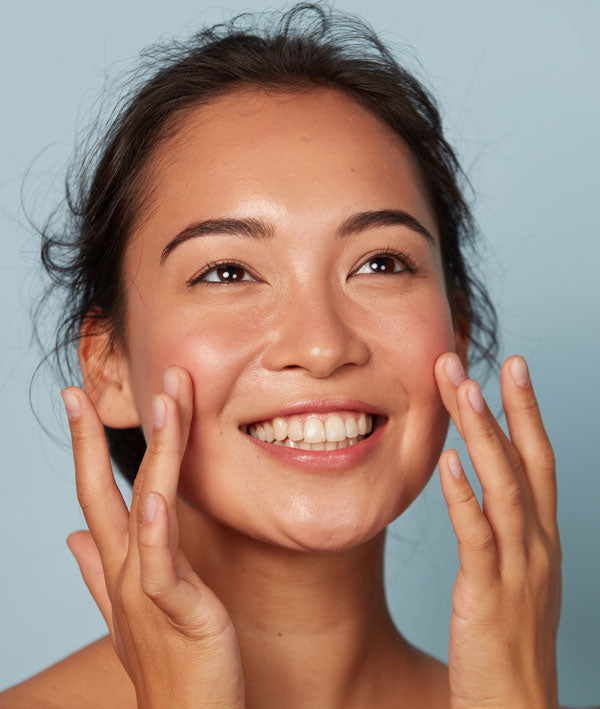Winter is hands-down the toughest season on the skin, especially when it comes to keeping it hydrated. Here are our top tips for maintaining healthy and hydrated skin – even during the coldest, driest weather.
1. Moisturizing Products
This winter, keep your skin hydrated from head-to-toe with well-formulated face and body moisturizers. A good formula will add moisture back to the skin while sealing in water to prevent dehydration. When shopping around, look for richer cream-based products made with ingredients like ceramides, squalane, shea butter, plant oils, hyaluronic acid, and glycerin. These are some of the best ingredients for maintaining soft, moisturized skin. Include a hydrating face mask to the mix 1-2x per week for extra moisture.
2. Humidifiers
Dry winter air can majorly impact the skin. Matters only get worse when you have the heater running constantly, since heaters dramatically reduce natural moisture levels in an environment. Thankfully, you can counteract these effects with a humidifier.
A humidifier will add humidity back to the air, creating a healthier environment for your skin. It’s best to run it as much as possible, but at the very least, have it on when you’re sleeping. This is when your skin is in recovery and repair mode, and it will greatly benefit from having that extra humidity in the air.
3. Hydrating Diet
The food you eat can also play a role in your skin’s hydration levels. This winter, hydrate from within through foods with high water content, such as cucumbers, celery, bell peppers, and oranges. Foods rich in omega-3 fatty acids – such as salmon, chia seeds, and walnuts – are also great for keeping your skin healthy and hydrated in the winter.
4. Hydration from Within
Of course, in addition to eating a hydration-focused diet, the ultimate way to hydrate from within is by drinking water throughout the day. The Mayo Clinic currently recommends 2.7 liters per day for women, and 3.7 liters per day for men.
We know water can get a bit boring, but don’t worry – there are other ways to hydrate. Pick up a few boxes of your favorite herbal teas, such as peppermint, chamomile, and ginger. They’ll help you stay warm and cozy, and will also mix up your hydration routine so that you can easily get the water intake you need.
5. Skincare Routine
It’s essential that you switch up your skincare routine once winter rolls around. The products that may have worked for you in the summer and fall won’t always give your skin the extra care that it needs when it’s being exposed to harsh elements.
First up, switch out any lightweight moisturizers with rich, cream-based products. You should also ditch any more aggressive face washes, and instead reach for gentle formulas loaded with hydrating ingredients.
If you aren’t already using a hyaluronic acid serum, the winter is also the perfect time to add one to your routine. The gentle and fragrance-free Hyaluronic Pure Boost Serum is designed to give parched skin the surge of hydration it needs. Apply it twice daily to damp skin to maintain supple, healthy skin.
6. Protecting Skin Barriers
The harsh elements of winter can make your skin barrier much more delicate, which can increase your risk of dryness, dehydration, and irritation. Some of the tips we’ve already mentioned – such as using well-formulated moisturizers and adapting your skincare routine for the winter – are key for protecting your barrier.
In order to best care for your barrier health, you may also need to lessen your use of more aggressive treatments like retinol and chemical exfoliants. For example, rather than using your retinol nightly, you might alternate between retinol and a more gentle anti-aging serum, such as the CoQ10 Boost Serum. Layer it with the Hyaluronic Pure Boost Serum to support hydrated skin and a healthy, calm barrier.
7. Non-Drying Makeup
If you’re a makeup wearer, the cosmetics you are using may be zapping hydration from your skin. Fragrances, essential oils, and dyes can aggravate and cause dryness, especially for those with sensitive skin. Alcohol is also commonly added to makeup formulas, but unfortunately it can affect hydration levels. Some of the most common ingredients include isopropyl alcohol, denatured alcohol, and SD alcohol.
Seek out formulas that omit these ingredients, and instead look for products infused with ingredients that can support the skin’s hydration and moisture levels. This can include ceramides, hyaluronic acid, oils, glycerin, and shea butter.
8. Avoid Common Pitfalls
Last but not least, it’s important to assess how your routines and lifestyle choices may be affecting your skin. For example, as comforting as they may be in the frigid winter, hot showers and baths are a huge problem for your skin, as they can reduce hydration levels. Instead, stick with warm water. Additionally, if you are sensitive to fragrances, you should also avoid scented home and body products (like lotions and laundry detergents), as they may aggravate and dry out your already fragile skin.







